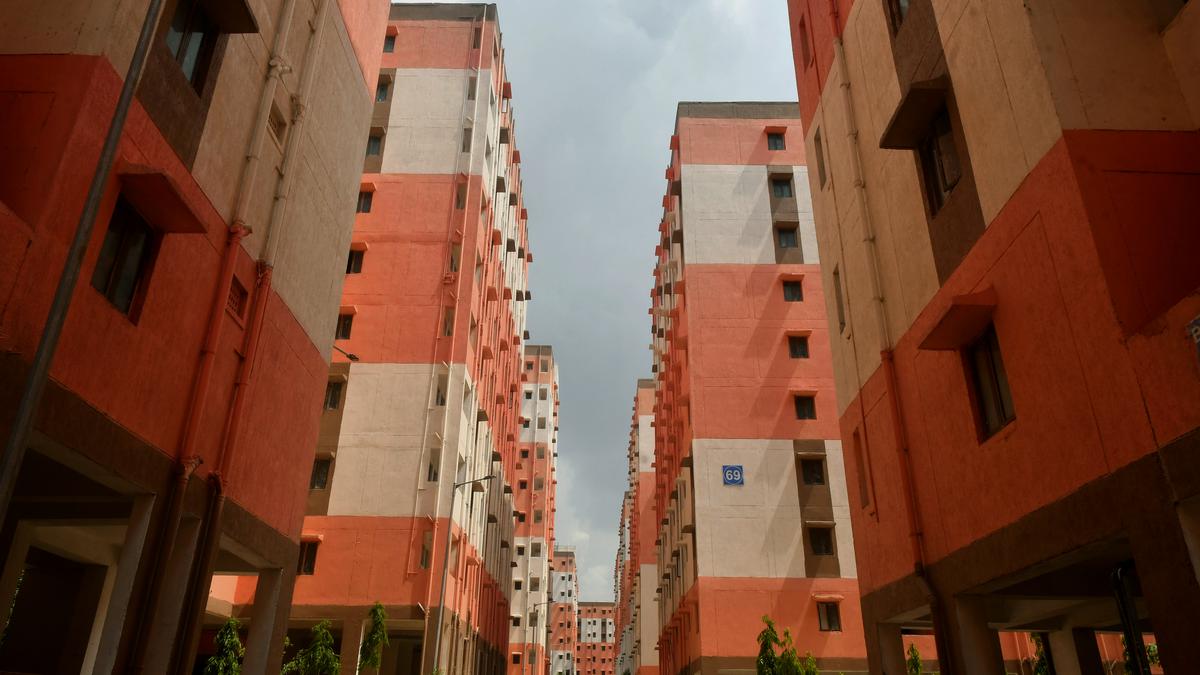
CM to set in motion 2BHK allotment with Kollur project launch
The Hindu
The project hosts a total 15,660 dwelling units in 117 blocks, each consisting of one hall, two small bedrooms, two toilets, one kitchen and a utility within 560 square feet of plinth area and 398 square feet of carpet area.
The double-bedroom dignity housing project at Kollur, said to be the largest government-funded housing project in Asia, will be launched by Chief Minister K.Chandrasekhar Rao on Thursday, unrolling a process of converting more than 60,000 dwelling units under this scheme into homes at various locations across the city.
The sprawling township, which in itself could contain a couple of municipalities, was being readied for the CM’s visit, when a media tour was organised there on Wednesday. A few blocks close to the inaugural site have been spruced up, and decked with marigold, hurried avenue plantation was on alongside the ORR service road abutting the township, and the road itself was being black topped on a war footing.
It has been two years since the units in what is now named as KCR Nagar have been complete in all respects and ready for inauguration. However, the lag in the identification of beneficiaries and inexplicable delays deferred the launch for a long time. Even now, nobody knows the basis or method of allotment, though the orders mentioned that allotment would be by lottery. More than five lakh applications were received for the 2BHK homes from across the city through various channels.
The project hosts a total 15,660 dwelling units in 117 blocks, each consisting of one hall, two small bedrooms, two toilets, one kitchen and a utility within 560 square feet of plinth area and 398 square feet of carpet area. Deserving special mention is the planning of open spaces in the township, with 63% of the 145.5-acre space allocated for roads, footpaths, greenery, playgrounds, and spaces earmarked for future social infrastructure.
OSD and Engineer Suresh Kumar, during a presentation, said only 108 housing units were constructed per acre. Fly ash bricks and superior quality cement was used in construction, he said.
“We have planted 30,000 trees in the township, a mix of flowering and native varieties. In the tot lots, backyards or enclosed space amid the blocks, we planted fruit-bearing varieties, such as mango, amla, and lemon, which will be of use for the residents in future. Along the boundary planted are trees with longevity such as tamarind and jamun,” explained director (Urban Biodiversity), GHMC, V.Krishna.
The driveways cast in concrete are 120 feet wide separated by thickly planted medians, not found even in the most expensive gated communities. As per the details shared by GHMC, the road length is 13.5 km, while the width ranges between 20 feet and 120 feet depending on its location.

 Run 3 Space | Play Space Running Game
Run 3 Space | Play Space Running Game Traffic Jam 3D | Online Racing Game
Traffic Jam 3D | Online Racing Game Duck Hunt | Play Old Classic Game
Duck Hunt | Play Old Classic Game











